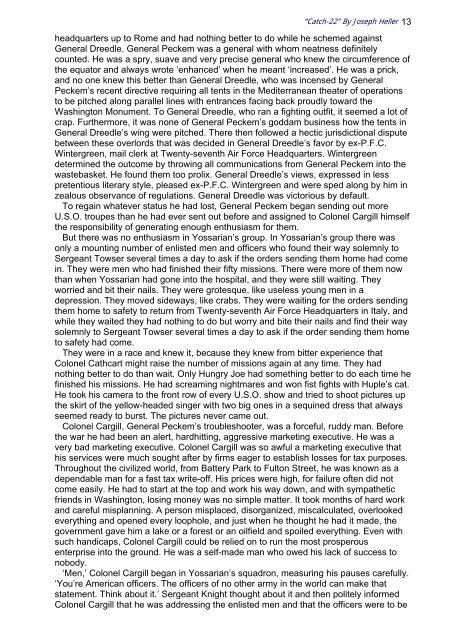You also want an ePaper? Increase the reach of your titles
YUMPU automatically turns print PDFs into web optimized ePapers that Google loves.
“Catch-22” <strong>By</strong> <strong>Joseph</strong> Heller 13<br />
headquarters up to Rome and had nothing better to do while he schemed against<br />
General Dreedle. General Peckem was a general with whom neatness definitely<br />
counted. He was a spry, suave and very precise general who knew the circumference of<br />
the equator and always wrote ‘enhanced’ when he meant ‘increased’. He was a prick,<br />
and no one knew this better than General Dreedle, who was incensed by General<br />
Peckem’s recent directive requiring all tents in the Mediterranean theater of operations<br />
to be pitched along parallel lines with entrances facing back proudly toward the<br />
Washington Monument. To General Dreedle, who ran a fighting outfit, it seemed a lot of<br />
crap. Furthermore, it was none of General Peckem’s goddam business how the tents in<br />
General Dreedle’s wing were pitched. There then followed a hectic jurisdictional dispute<br />
between these overlords that was decided in General Dreedle’s favor by ex-P.F.C.<br />
Wintergreen, mail clerk at Twenty-seventh Air Force Headquarters. Wintergreen<br />
determined the outcome by throwing all communications from General Peckem into the<br />
wastebasket. He found them too prolix. General Dreedle’s views, expressed in less<br />
pretentious literary style, pleased ex-P.F.C. Wintergreen and were sped along by him in<br />
zealous observance of regulations. General Dreedle was victorious by default.<br />
To regain whatever status he had lost, General Peckem began sending out more<br />
U.S.O. troupes than he had ever sent out before and assigned to Colonel Cargill himself<br />
the responsibility of generating enough enthusiasm for them.<br />
But there was no enthusiasm in Yossarian’s group. In Yossarian’s group there was<br />
only a mounting number of enlisted men and officers who found their way solemnly to<br />
Sergeant Towser several times a day to ask if the orders sending them home had come<br />
in. They were men who had finished their fifty missions. There were more of them now<br />
than when Yossarian had gone into the hospital, and they were still waiting. They<br />
worried and bit their nails. They were grotesque, like useless young men in a<br />
depression. They moved sideways, like crabs. They were waiting for the orders sending<br />
them home to safety to return from Twenty-seventh Air Force Headquarters in Italy, and<br />
while they waited they had nothing to do but worry and bite their nails and find their way<br />
solemnly to Sergeant Towser several times a day to ask if the order sending them home<br />
to safety had come.<br />
They were in a race and knew it, because they knew from bitter experience that<br />
Colonel Cathcart might raise the number of missions again at any time. They had<br />
nothing better to do than wait. Only Hungry Joe had something better to do each time he<br />
finished his missions. He had screaming nightmares and won fist fights with Huple’s cat.<br />
He took his camera to the front row of every U.S.O. show and tried to shoot pictures up<br />
the skirt of the yellow-headed singer with two big ones in a sequined dress that always<br />
seemed ready to burst. The pictures never came out.<br />
Colonel Cargill, General Peckem’s troubleshooter, was a forceful, ruddy man. Before<br />
the war he had been an alert, hardhitting, aggressive marketing executive. He was a<br />
very bad marketing executive. Colonel Cargill was so awful a marketing executive that<br />
his services were much sought after by firms eager to establish losses for tax purposes.<br />
Throughout the civilized world, from Battery Park to Fulton Street, he was known as a<br />
dependable man for a fast tax write-off. His prices were high, for failure often did not<br />
come easily. He had to start at the top and work his way down, and with sympathetic<br />
friends in Washington, losing money was no simple matter. It took months of hard work<br />
and careful misplanning. A person misplaced, disorganized, miscalculated, overlooked<br />
everything and opened every loophole, and just when he thought he had it made, the<br />
government gave him a lake or a forest or an oilfield and spoiled everything. Even with<br />
such handicaps, Colonel Cargill could be relied on to run the most prosperous<br />
enterprise into the ground. He was a self-made man who owed his lack of success to<br />
nobody.<br />
‘Men,’ Colonel Cargill began in Yossarian’s squadron, measuring his pauses carefully.<br />
‘You’re American officers. The officers of no other army in the world can make that<br />
statement. Think about it.’ Sergeant Knight thought about it and then politely informed<br />
Colonel Cargill that he was addressing the enlisted men and that the officers were to be
















